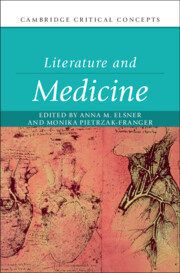Book contents
- Literature and Medicine
- Cambridge Critical Concepts
- Literature and Medicine
- Copyright page
- Dedication
- Contents
- Figures
- Contributors
- Acknowledgements
- Medico-Literary Pathways, Crossroads, and Side Streets
- Part I Origins: Histories
- Part II Developments: Forms
- Part III Applications: Politics
- Chapter 15 Malaria Literature
- Chapter 16 Forgotten Class
- Chapter 17 The Human Endeavour
- Chapter 18 Re-framing and Re-forming Disability and Literature
- Chapter 19 Overcoming Decline (in) Narrative
- Chapter 20 Literature as a Form of Care?
- Chapter 21 Literature in Collaboration
- Afterword
- Index
Chapter 17 - The Human Endeavour
Bioethics and Biocapitalism in Don DeLillo’s Zero K
from Part III - Applications: Politics
Published online by Cambridge University Press: 17 January 2024
- Literature and Medicine
- Cambridge Critical Concepts
- Literature and Medicine
- Copyright page
- Dedication
- Contents
- Figures
- Contributors
- Acknowledgements
- Medico-Literary Pathways, Crossroads, and Side Streets
- Part I Origins: Histories
- Part II Developments: Forms
- Part III Applications: Politics
- Chapter 15 Malaria Literature
- Chapter 16 Forgotten Class
- Chapter 17 The Human Endeavour
- Chapter 18 Re-framing and Re-forming Disability and Literature
- Chapter 19 Overcoming Decline (in) Narrative
- Chapter 20 Literature as a Form of Care?
- Chapter 21 Literature in Collaboration
- Afterword
- Index
Summary
This chapter uses Don Delillo’s novel Zero K to consider the historical and structural relationship between bioethics and biocapitalism, particularly in the development of consent forms and contract labour. In this way, the essay examines the role human capital theory and transhumanism have played in influencing definitions of human nature and the bioethical frameworks predicated on these definitions. Using the techniques of literary narrative bioethics and feminist relational bioethics, the essay carefully interprets Zero K’s treatment of cryonics as a bioethical dilemma too often contained and constrained by historical and ideological conceptions of consent, which the novel seeks to critique. Ultimately, the chapter offers a form of posthuman literary narrative bioethics as an alternative methodology.
Keywords
- Type
- Chapter
- Information
- Literature and Medicine , pp. 297 - 312Publisher: Cambridge University PressPrint publication year: 2024

